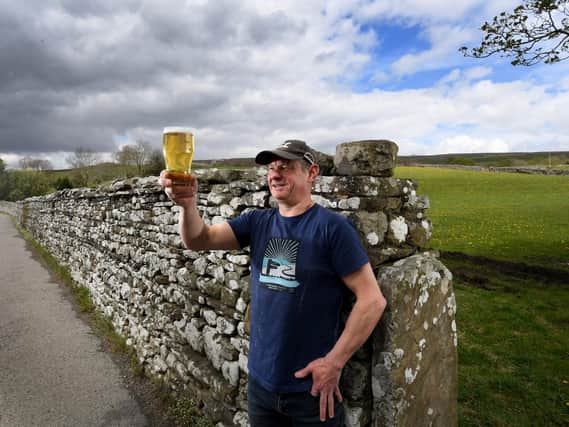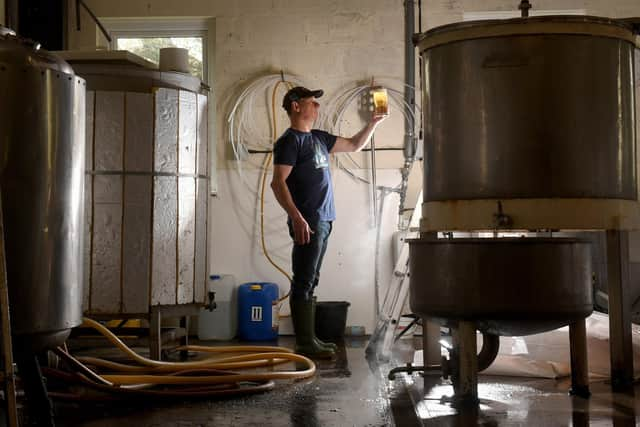How the Yorkshire Dales Brewing Company in an old railway station gives back to local farmers


The spent grains from the barley malt used in the production of such themed ales as Butter Tubs, Drovers Arms and Bainbridge Blonde are a valuable feed resource for livestock. Micro brewery owner Rob Wiltshire said he is delighted to be able to give something back to the countryside and his neighbours.
“We give the spent grains away. We generally brew four times a week and on a regular brew we use around 150 kilos of barley malt. After the mash is completed we have the leftover malt.
Advertisement
Hide AdAdvertisement
Hide Ad“We don’t want it on site and need to get rid of it. Some sell it as a by-product but I take the view that it is helping our local farmers with their feed. It has a lot of goodness in it and leaves here within an hour of having been in our mash tun.


“Last week I brewed a 9.5 per cent beer and had 400 kilos of malt to dig out by hand, which I put in several one-metre high bags.
“The spent grains provide a really intoxicating aroma that you can tell the cows like on Allen Kirkbride’s Town End Farm. They all usually stand up expectantly when they smell it being unloaded. Colin Anderson’s pigs also love it and I’ve just had an approach from another dairy farmer.”
Rob started the Yorkshire Dales Brewing Company from a garage at home in Leyburn before moving his brewery initially to Hawes and then into a former milking parlour in Askrigg before switching to the site of the old railway station four years ago.
Advertisement
Hide AdAdvertisement
Hide AdRob said the connections between farming and brewing are steeped in Yorkshire’s and his past and that the recent massive increase in micro-breweries and craft beers has also heralded a new swathe of hop farming in the UK as well as increased malt production.
“Most of the barley malt and torrefied wheat we use comes from Thomas Fawcett’s, maltsters based in Castleford. I wanted to use their malt when I started because I was born in Pontefract and felt an affinity with them.
“Fawcett’s produce incredible malts and have been around for 200 years. A lot of their barley comes from the Yorkshire Wolds and they also have some of their own farms. I use the Maris Otter variety of barley in 90 per cent of my beers because of the clarity you get in the end product. I also use torrefied wheat in many of my beers too. Torrefying helps with head retention in the beer, which is great for our cask ales.
“The move towards craft beers initially saw American hops being used almost wholly but it has also brought about a renaissance in hop farming in counties such as Herefordshire, Worcestershire and Kent. We have just brewed using Jester hops, a newish variety from Herefordshire. I’m now using more British hops in the craft beers, including Darker Times, which is 7.4 per cent and also uses dark roast barleys.”
Advertisement
Hide AdAdvertisement
Hide AdRob said his passion for the Dales, cycling and spending more time with his wife Anne and their sons as they were growing up had brought about an end to his globetrotting career that had included working in Dallas, Frankfurt and London and big name employers such as the European Space Agency.
“The mathematicians and super intelligent people dealt with all the clever stuff. I dealt with software, but it was incredible.
“Anne and I had met when I was working for Wallace Arnold. We’d married in 2000, had our first child in 2001 and the crunch came when I was working away in London and Chester five days a week for a Japanese investment bank and Bank of America for the first three years of his life.
“We had moved to Richmond and then Leyburn and I started thinking about what I could do where I could work in the Dales that allowed me to be at home seven days a week and enjoy my family, the countryside and cycling.
Advertisement
Hide AdAdvertisement
Hide Ad“I’d always had a healthy interest in beer and when I’d worked in America I’d seen this craft beer thing in its infancy. I thought it would be quite interesting to do those American- style beers in the Dales, as well as producing the traditional real ales that are loved by everyone visiting this area. In 2005 I started looking at setting up a micro brewery.
“We have become more adventurous as consumers have gone the same way and because I use six kits that each provide only five barrels worth of beer at a time we produce a huge range of beers. At present we have 18 bottled beers, 16 canned beers and our cask range.”
Beer tourism is a relatively new phenomenon that Rob said is something he has seen develop in recent years.
“People are actively seeking out breweries when they go on holiday and we open our bar and beer garden on Fridays and Saturdays,” he said.